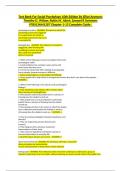Exam (elaborations)
Social Psychology 10th Edition By Elliot Aronson; Timothy D. Wilson; Robin M. Akert; Samuel R Sommers 9780134641287 Chapter 1-13 Complete Guide .
- Course
- Institution
- Book
Social Psychology 10th Edition By Elliot Aronson; Timothy D. Wilson; Robin M. Akert; Samuel R Sommers 9780134641287 Chapter 1-13 Complete Guide .
[Show more]




